

Egeria (pilgrim) Cover of a translation into English of The Journey of Egeria published in 1919.
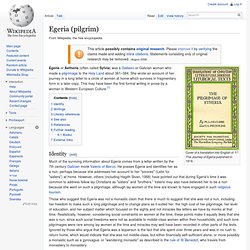
Egeria or Aetheria (often called Sylvia) was a Gallaeci or Galician woman who made a pilgrimage to the Holy Land about 381–384. She wrote an account of her journey in a long letter to a circle of women at home which survives in fragmentary form in a later copy. This may have been the first formal writing in prose by a woman in Western European Culture.[1] Those who suggest that Egeria was not a monastic claim that there is much to suggest that she was not a nun, including: her freedom to make such a long pilgrimage and to change plans as it suited her, the high cost of her pilgrimage, her level of education, and her subject matter which focused on the sights and not miracles like letters we have by monks at that time.
Egeria set down her observations in a letter now called Itinerarium Egeriae, or the Travels of Egeria. Vulgar LatinItinerarium Burdigalense Eteria, Egeria (2010). Donatism. Donatism was an indirect outcome of Diocletian's persecutions.
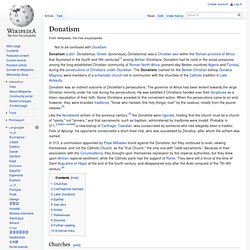
The governor of Africa had been lenient towards the large Christian minority under his rule during the persecutions. He was satisfied if Christians handed over their Scriptures as a token repudiation of their faith. Some Christians acceded to this convenient action. Meletius of Lycopolis. Melitius (died after 325) was bishop of Lycopolis in Egypt.
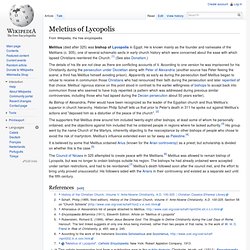
He is known mainly as the founder and namesake of the Melitians (c. 305), one of several schismatic sects in early church history which were concerned about the ease with which lapsed Christians reentered the Church. [1] (See also Donatism.) The details of his life are not clear as there are conflicting accounts of it. According to one version he was imprisoned for his Christianity during the persecution under Diocletian along with Peter of Alexandria (another source has Peter fleeing the scene; a third has Melitius himself avoiding prison). Apparently as early as during the persecution itself Melitius began to refuse to receive in communion those Christians who had renounced their faith during the persecution and later repented of that choice. Christian eschatology. Christian eschatology is a major branch of study within Christian theology.
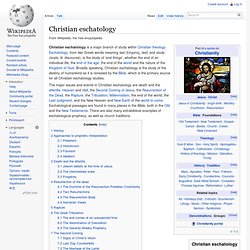
Eschatology, from two Greek words meaning last (ἔσχατος, last) and study (λογία, lit. discourse), is the study of 'end things', whether the end of an individual life, the end of the age, the end of the world and the nature of the Kingdom of God. Apocalypse. St.
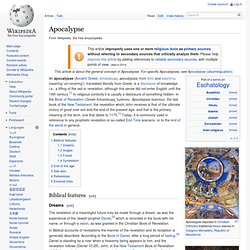
John at Patmos: the receiving of an apocalyptic vision An apocalypse (Ancient Greek: ἀποκάλυψις apocálypsis, from ἀπό and καλύπτω meaning 'un-covering'), translated literally from Greek, is a disclosure of knowledge, i.e., a lifting of the veil or revelation, although this sense did not enter English until the 14th century.[1] In religious contexts it is usually a disclosure of something hidden. Christian soteriology. Dualism. Christology. Christ Pantocrator. In Christian iconography, Christ Pantocrator refers to a specific depiction of Christ.
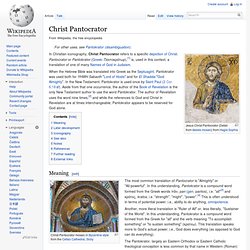
Pantocrator or Pantokrator (Greek: Παντοκράτωρ),[1] is, used in this context, a translation of one of many Names of God in Judaism. When the Hebrew Bible was translated into Greek as the Septuagint, Pantokrator was used both for YHWH Sabaoth "Lord of Hosts" and for El Shaddai "God Almighty". In the New Testament, Pantokrator is used once by Saint Paul (2 Cor 6:18). Orant. Orant (Christian art. Crisis of the Third Century. The divided Empire in AD 271.
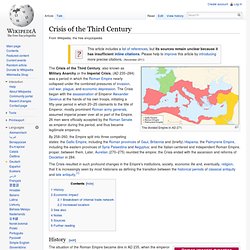
The Crisis of the Third Century, also known as Military Anarchy or the Imperial Crisis, (AD 235–284) was a period in which the Roman Empire nearly collapsed under the combined pressures of invasion, civil war, plague, and economic depression. The Crisis began with the assassination of Emperor Alexander Severus at the hands of his own troops, initiating a fifty-year period in which 20–25 claimants to the title of Emperor, mostly prominent Roman army generals, assumed imperial power over all or part of the Empire. 26 men were officially accepted by the Roman Senate as emperor during this period, and thus became legitimate emperors.
The Crisis resulted in such profound changes in the Empire's institutions, society, economic life and, eventually, religion, that it is increasingly seen by most historians as defining the transition between the historical periods of classical antiquity and late antiquity.[1] History[edit] Economic impact[edit] Emperor Diocletian. Diocletian. Antoninianus of Diocletian Not all of Diocletian's plans were successful: the Edict on Maximum Prices (301), his attempt to curb inflation via price controls, was counterproductive and quickly ignored.
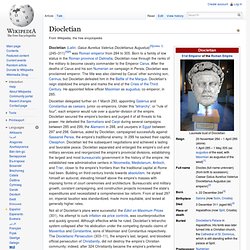
Although effective while he ruled, Diocletian's tetrarchic system collapsed after his abdication under the competing dynastic claims of Maxentius and Constantine, sons of Maximian and Constantius respectively. The Diocletianic Persecution (303–11), the empire's last, largest, and bloodiest official persecution of Christianity, did not destroy the empire's Christian community; indeed, after 324 Christianity became the empire's preferred religion under its first Christian emperor, Constantine.
Early life[edit] Panorama of amphitheatre in Salona Death of Numerian[edit] Emperor Carus' death left his unpopular sons Numerian and Carinus as the new Augusti. Conflict with Carinus[edit] Tetrarchy. The term Tetrarchy (Greek: "leadership of four [people]") describes any form of government where power is divided among four individuals, but in modern usage usually refers to the system instituted by Roman Emperor Diocletian in 293, marking the end of the Crisis of the Third Century and the recovery of the Roman Empire.
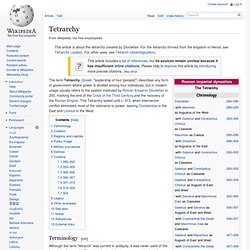
This Tetrarchy lasted until c. 313, when internecine conflict eliminated most of the claimants to power, leaving Constantine in the East and Licinius in the West. Terminology[edit]